Welcome to the world my new mokopuna Bella O’Reilly and Te Roera Junovich. Welcome to Aotearoa the land of your mums’ and dads’. Thank you for joining us and complementing the whanau whakapapa. God bless you both.
Bella has the blood of two Maori politicians in her veins, on her dad’s side Tareha Te Moananui MP, the first Maori to speak in the House (Aug 4 1868) and on her mum’s side Sir James Carroll MP, Timi Kara, the Maori who represented both the European and Maori seats and the only Maori ever to act as Prime Minister of this country. Better watch this girl.
Young Master Junovich as the name suggests brings a mix a bit of good old Kiwi Dally and blends those bloodlines with me and mine in that brew we call Pakeha – Ngati Pakeha no Aotearoa.
Now, on the other hand, according to her Birth Certificate, their nanny Taape, my lady, mother to Bella’s dad, as she is to Te Roera’s mum, is a Maori of ‘full blood’. This is a consequence of herself being the child of parents also of ‘full blood’. Those Maori, neither gone nor vanquished eh!
I’ve obviously been absolutely no help at all in preserving the indigenous bloodlines. I suppose that I subscribe to the view held by the late Sir Keith Holyoake who reckoned that miscegenation would provide the basis for good race relations in New Zealand – the iwi in Kiwi would emerge from the bedrooms of the nation.
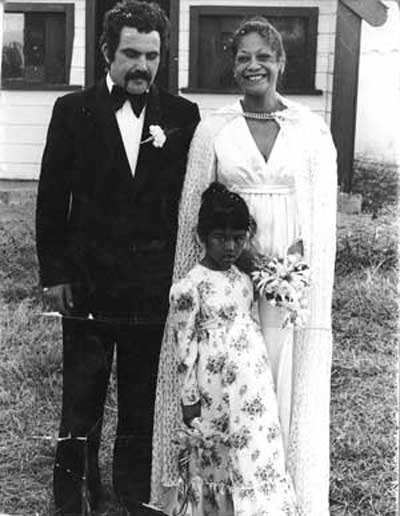
My Lady
Kiwi and iwi have recently been presented as being mutually exclusive notions, but it’s ‘and/both’ from my point of view. I mean it’s all obvious in the inclination of the spelling. The necessary interdependency is impli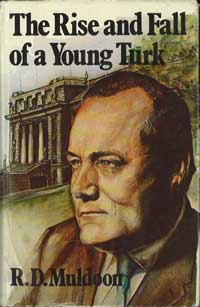 cit. You simplycan’t spell ‘Kiwi ‘ without ‘iwi’.
cit. You simplycan’t spell ‘Kiwi ‘ without ‘iwi’.
Beating up on things Maori gets great applause in the provinces. It isn’t new and over time National hasn’t been the only beneficiary;
“Duncan MacIntyre’s defeat in Hastings can be explained only as a backlash against his success as Minister of Maori Affairs in identifying himself with the Maori. Hastings had a Maori problem and every time MacIntyre was photographed on a marae I believe he lost support in Hastings.”
RD Muldoon The Rise and Fall of a Young Turk AH Reed 1974 (Pg 141)
And ‘one standard of citizenship’ isn’t a new pitch either;
“I will now enter upon another subject and will speak with regard to other matters which are being carried on in Napier with regard to the pound that is there. It is a great grievance to me, the Maori, is the pound. My property is put into it, my horses and cattle, and are sold, and a grievance lights down upon me, the Maori; I thought therefore it would be better that I should have a pound myself so as to impound the cattle of Europeans trespassing on Maori cultivations in the same manner. When I thought to have a pound to myself I was taken to the Court; so it has occurred to me to propose to you that when you make a law, you should make it for me as well as for yourselves. It has been laid down in the Scripture and also by your own law, that there should be one law for both of us.”
Tareha Te Moananui MP, in NZ Parliamentary Debates 3rd Session 4th Parliament Second Volume August 4th 1868 Hansard (Pg 271)
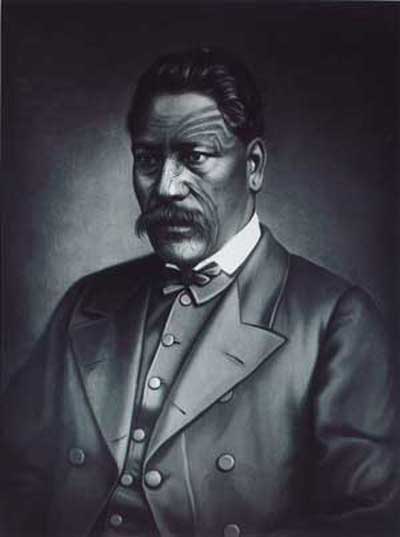
Tareha Te Moananui MP, the first Maori to speak in the House, Gottfried Lindauer
Speaking of Tareha, I’ve recently publicly raised an issue previously dealt with privately by Ngati Paarau, Napier’s local hapu founded by Tareha. The issue is the fact that ‘Tareha Reserve’, a recreational reserve in Taradale has been renamed ‘Carters Arms Park’ by a local sports club. It’s a quid pro quo for a sponsorship.
But hey! Wait a moment, the place already has a name! It’s Tareha Reserve, a name formally conferred on the area by the Napier City Council after a process of public consultation. To change it, or to trump it with another, in my view turns a rightfully deserved act of respect and appreciation into an act of insult. The hapu drew that matter to the attention of the sports club and the Napier City Council two years ago. Their gentle ‘and/both’ suggestion was to name the clubrooms after the sponsor, ‘Carters Arms Pavilion’ or such, so that the conferred name of the area could be re-instated. It could be ‘Carters Arms Pavilion at Tareha Reserve’. The Napier City Council has been reminded, the Mayor asked to act but there’s not a lot of traction in taking on a ‘mainstream’ rugby club to ensure a ground is properly called a Maori name. Rob Muldoon’s lesson about the dangers of being pro-Maori has been well learned around here.
The Mayor of Napier feels terribly offended when I suggest that the local Councils display institutional or systemic racism. Just last week Mayor Arnott wrote to me telling me that
“your references to Local Bodies being influenced by anything other than common good or common sense are offensive to those who serve the community and strive for balance and equity in their decisions”.
Well, hell…..innocence may not yet be all lost.
My current battle with the Councils has been over access to sports fields for rugby league – we have about 560 people currently playing. I had put the fact that the rugby league code was excluded from planning for new sports facilities to the systemic racism to which I have earlier alluded.
But as I reflected on the matter, reflecting on the Mayor’s views and those of the Taradale Rugby and Sports Club I began to wonder if what I was seeing in this particular matter was something other than racism, less pernicious perhaps but even more stupid – ‘codeism’ – the intolerance shown by a stronger more powerful sports code to another.
A number of years ago central government agencies encouraged the clustering of individual codes into ‘sports clubs’ where resources and facilities could be shared and use optimized. In Hawke’s Bay most rugby clubs are sports clubs and a number of them (Clive, MAC, Maraenui, Tamatea) also run rugby league teams.
It makes good sense. Rugby league and rugby union are both played on the same fields, use the same goal posts, use the same ball and the overall game is similar.
There is a long history of player interchange. The great George Nepia played both codes. Jonah Lomu and Tana Umaga came to rugby union from rugby league. Current All Black Piri Weepu’s ambition is to play rugby league for the Kiwis. Star of the NRL Grand Finals Benji Marshall came to league from union. It’s not either nor, it’s and, both.
In a provincial area such as Hawke’s Bay rugby union is by far the lead sport and there’s no issue about that. As compared to rugby league, union is older, wealthier and played by far more people. We’re proud of our regional rugby union team – the Magpies – and in fact the local league community supported their union brothers in their recent bid for first division status.
In most circumstances the interests of league and union players are compatible – the philosophy of coompetition springs to mind – and conflicts can be minimized by intelligent scheduling of games, optimized use of training facilities and having transparent arrangements over a player’s commitment to a specific team over the period of a season or competition.
When young, many players handle playing both codes simultaneously. If you are good in one – gifted even – you will most likely also shine in the other. God gives two arms with which to catch, pass and tackle, two legs to step and sprint with so why not at least two codes to show them off in?
League is a complementary code to rugby union. It helps keep rugby fresh. For my part league is harder faster and more exciting, but union with all its on field bureaucracy still carries the memories and hopes of the nation and we should support and build on that.
The important thing is to enable people to participate; to exercise their physical and social muscles, to build a sense of camaraderie, to experience challenges that call for courage, to taste the thrill of a win and the satisfaction that comes with doing one’s best. These are the needs of community that are met by the provision of opportunities for sport.
The wants of a community may indeed be something else; a big stadium, high performing wealth generating teams. But the essential needs must first be met and this is where I believe our Local Bodies get things out of kilter. We’ve got to ensure that some resource is directed at getting the otherwise disengaged involved. League tends to keep some people who are not attracted to rugby union socially connected by way of participation in organized team sport. That is valuable, and it should be recognized for that.
The electoral and geographic map has been coloured blue and red; blue for country red for city, blue for Crips and red for Bloods, blue for Blacks and red for Mob, what is it about these colours?
Provincial and rural New Zealand have lined up against the urbanites, the brown and the different. It’s 1981 without the Tour. Uncertainty reigns. Don Brash is courting the Maori Party, Murray McCully giving Maori TV a bit of slipper for offering its clients a loss leader by way of free advertising. Better look up Rob Muldoon about how to manage the Maori thing again.
“His wisdom encompassed the three essentials – the western, or Pakeha, for material advancement; the Maori, or traditional, for cultural heritage; and God for the spiritual blessing. It is in this simple analysis that I believe we find the future for our people [his italics].
R D Muldoon speaking of Sir Apirana Ngata in ‘My Way’ Reed 1981 (Pg 6).
Maori for our cultural heritage! The future of our people! Crikey, I wonder if Don’s read that?
We have a nation building struggle ahead of us but Rob Muldoon’s prescience may prove to be true. The first cohort of Kohanga Reo kids are now in their mid-20’s and are imbued both with a sense of Maori cultural locus and appreciation of the Pakeha material world. We are seeing many of them graduating with quality tertiary degrees and bringing a fresh ambidextrous capacity to their respective whanau and hapu.
Taape and I recently went down south for the Otago University Graduation at the Law School for our youngest son Laurie. He is named Laurence Bunny O’Reilly – Laurence after my late brother Laurie, and Bunny after Taape’s elder brother Bunny Tareha. Bunny flew over from Sydney and we all hooked up in Dunedin for the capping. I was sad that my brother couldn’t be there with us standing beside Bunny, and giving the young fulla a congratulatory handshake, but at least his name will be carried again in the Courts of NZ Law. Like thousands of mums and dads and uncles before us our hearts swelled with pride for the achievements of our young, and with gratitude for all those who had contributed to their learning. Vivat academia! Vivant professores! to be sure.

Laurence Bunny O’Reilly and Bunny Tareha
That trip south was nostalgia in trumps. We drove. I feel the need to earn a journey for an important event. The road along that Kaikorua coastline is to die for, and many do as is evident by the white crosses marking the route. I love living in the Hawke’s Bay but damn I miss those Southern Alps and grand rivers. After dropping in to cousin Paddy’s ‘O’Reilly’s Store’ in Temuka we parked up in Timaru in a motel almost adjacent to where my family home once stood – it’s a Briscoes Store now.
I crossed the road to visit my dad’s old friend Peter Groot, a still fit and feisty Dutchman. I’ve been told I look like my dad and that I have some of his mannerisms. Peter Groot confirmed it. “Oh my Gott! He said as I came up the steps “its Dinny O’Reilly come back from the dead!”
We yakked. Pete told tales, some of which I remembered and some of which were new. It was when we recalled that dad used to wash his heart pills down with a solid glass of whiskey that a gleam of understanding came over Taape and Laurie’s faces and my proclivity for the drink gained context and, I hope, understanding! Of course ‘Ireland sober will be Ireland free’ and I’ve been really conscious about cutting down the booze. I’m binary by nature so when it comes to most things it’s either on switch or off, and, at the moment, for the booze, it’s off.
Recently I’d had a busy day in Wellington and had been trying to meet up with my eldest mokopuna. He’d just celebrated his 16th birthday. When I rang his mate answered the phone, mistook me for someone else, and started to tell me with youthful bravado about how the cops had just issued a whole lot of them with some papers. I was in like Flynn.
The ‘paper’ in question was a “Warning Pursuant To Section 98(A) of the Crimes Act” which warned my moko that the “Darkside and Black Power at Wellington New Zealand are an Organised Criminal Group”.

Tuone and Rogue of the Darksiders
The offence of participating in a Criminal Group is a serious charge and carries a term of up to five years imprisonment. It is a tool in the fight against seriously organised crime and I was taken aback that it was being deployed against these young people.
I grabbed my moko and took him down to Wellington Central. I wanted to talk to the coppers about what was up and where my boy fitted in. Sometimes when you go to ask a question like this you can get flim-flammed around. This time the guy in charge, Sgt Todd, took the time to sit down with us and ran through the scenario from his point of view. Basically the cops see these young fellows as being fledgling Black Power with the Darksiders filling the role of virtual prospects. The cops blamed them for a burst of inner city crime.
I explained to Sgt Todd that I am a member of the Black Power and that I am neither a criminal nor part of a criminal group or criminal conspiracy.

Black Power National Committee Waananga Toa, Wanganui 1988
My grandson is not a member of the Black Power because he is not allowed to be. He does hang around with the Darksiders and up until this point I had been relaxed enough about that because for me Darksiders were a crew of the brothers who had a rap group – they supported us with a performance at Parliament when we were doing the ‘Sinners Tour’ with Joe Walsh.
These guys haven’t been sitting on their hands. They are currently ‘the’ NZ gangsta-rap crew in Wellington. They have a huge wave of followers who have got this viral thing rolling with clusters of posses through the Wellington City and the Hutt Valley. They are a brand as well as a band, but slightly out of control.
Anyway, the Mokai Whanau Ora project boys organized meetings with the cops and the young fullas, put a bit more effort around getting a softball team going, and formed up regular games of touch. The musos amongst them want to make more music. The untrained and unqualified followers and hangers on want skills and qualifications so they can get jobs. Positive plans are being hatched even as I write.

Black Power National Committee Waananga Toa, Wanganui 1988
Some of the cops have been supportive, others are cynical. There is a campaign called ‘Operation Hurricane’ that is being run against the Darksiders but the older guys have been keeping the younger ones close at hand and out of the city as much as is possible. If some want to play negatively then they face the consequences of their behaviour. On the other hand if they want to get into something positive then the opportunities are there too. The international criminal conspiracy defeated again perhaps!
I had a visit last week from Dr John Newton, who is at the Department of English at Canterbury University. John is studying the social impact of James K Baxter and he sees the work that we’re doing with Nga Mokai as a continuation of Hemi’s legacy of the communes and the work co-operative movement.
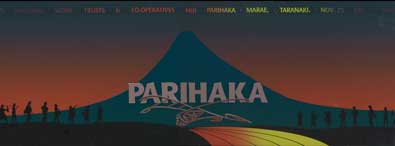
Poster for 4th National Work Trusts & Co-operatives Hui, 25 November - 1 December 1985
John’s view is, in part, that this particular meeting pictured below, held at Hiruharama (Jerusalem) on the Wanganui River in 1988 marked the natural conclusion of Hemi’s kaupapa in this regard.
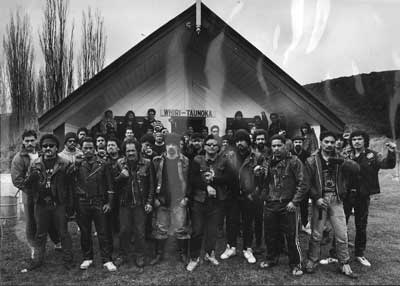
Te Whare Mana Trust - Black Power National Committee Waananga Toa, Hiruharama, Wanganui, Akuhata 1988
As these columns attest I’m an unashamed Baxterite and it was uplifting to think that we are seen to be carrying through on the poet’s kaupapa.
It’s useful weaponry he left us, the principles he called the ‘five water-worn stones’ as missiles for our slings in the communal struggle against our modern day Goliaths;
arohanui: the love of the many
manuhiritanga; hospitatlity to the guest and stranger korero; speech that begets peace and understanding matewa; the night life of the soul
mahi; work undertaken from communal loveJerusalem Daybook (pg 54)
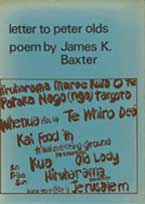

Last night the cold snap meant that scores of helicopters were out hovering above the vineyards and orchards to ward off frost damage. The chill came in early so that the choppers headed out as night fell. In the luminescence of a bright moon and translucent sky, and with the thud thud of their rotating blades, it was quite surreal. The noise, the technology, all fitted in with the context of the natural beauty. They had a purpose, were an essential part of the countryside.
This morning the frost was crisp underfoot as Taape and I took our daily walk down to the river. The Tutaekuri was sparkling and clear. Slivers of silver signaled that the whitebait are still running. News has come from the south that the godwits have returned from Siberia for the summer ahead. Politics, petrol prices, and a thousand urgent jobs fall into place and perspective.
E hoa,
let me
Sit in your house for an hour,
We will talk about
The things that concern us bothAnd tomorrow the sun will rise
And the day after
Until the day
They bury us‘New Mood Song’ James K Baxter
arohanui
Denis.





















